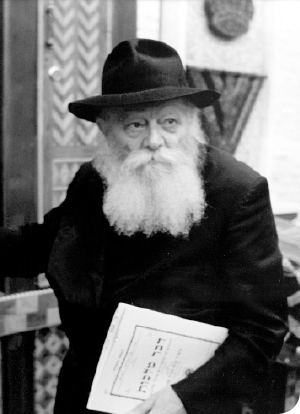That book is part of the very life of the Rebbe – in the past, the present, and the future, until the end of all generations (for “his progeny is alive,” as above). It follows that taking his seifer is tantamount to taking part of the Rebbe’s life, may G-d have mercy! * From Chapter Eight of Rabbi Shloma Majeski’s Likkutei Mekoros (Underlined text is the compiler’s emphasis.)
Translated by Boruch Merkur
 According to what was said [above about the Rebbe Rayatz] – that “hu ba’chayim – he is alive” – the histalkus has changed nothing. In this respect, the concept of inheritance is completely irrelevant, both with regard to the home of my revered father in-law, the Rebbe, as well as his possessions, his collection of books, etc.
According to what was said [above about the Rebbe Rayatz] – that “hu ba’chayim – he is alive” – the histalkus has changed nothing. In this respect, the concept of inheritance is completely irrelevant, both with regard to the home of my revered father in-law, the Rebbe, as well as his possessions, his collection of books, etc.
(All this is said notwithstanding the legal ownership of Agudas Chassidei Chabad of the library as well as the home where the Rebbe resided. The entire building, including his residence, is owned by Agudas Chassidei Chabad, as evident by the deed of purchase.)
Now, with regard to the s’farim, the inapplicability of inheritance is particularly emphatic:
As we have discussed, the life of a tzaddik is not physical life but spiritual life. To be precise, his life consists of faith in G-d, as well as awe and love of Him.
And it is by means of s’farim that a tzaddik learns nuances pertaining to matters of faith, fear, and love, and contemplating the depths of these matters, all of which comprise the foundation of his service of G-d in general, as well as his Torah study and fulfillment of Mitzvos.
It comes out then that the s’farim of a tzaddik, from which he studied and prayed, are his very life!
And when we are speaking about a leader of the Jewish people, the leader of the movement of Lubavitch, “hu ba’chayim – he is alive” on account of the fact that “zar’o ba’chayim – his progeny is alive,” especially in virtue of the s’farim he used.
On this basis, how is possible that someone could have the audacity to enter the home of the Rebbe without permission and take something from there, especially a seifer, a book from his library?! That book is part of the very life of the Rebbe – in the past, the present, and the future, until the end of all generations (for “his progeny is alive,” as above). It follows that taking his seifer is tantamount to taking part of the Rebbe’s life, may G-d have mercy! The entire time anyone who has taken a seifer from the Rebbe (without permission) and does not return it – that person causes the concept of a levaya, a funeral procession, rachmana litzlan!
Moreover, even where the concept of inheritance is applicable, none of the inheritors may take anything in order to divvy up the inheritance. One must go to a beis din to arrange an appraisal in order to know the value and worth of the bequeathed property, and only then, with the consent of all the inheritors, etc., may one broach the subject of dividing up the inheritance.
In our case, there was, of course, no will regarding the division of the inheritance (and there is no point in attempting to forge and discover some sort of will in connection with the division of the estate). Thus, throughout the thirty-five years since the Rebbe’s histalkus, all the s’farim and manuscripts, etc., remained as they were from before, without any change!
Since this is so, how is possible to take anything without permission, even if there is a claim of inheritance?! How much more so in our case, where the concept of inheritance is from the outset absolutely inapplicable, as stated above at length.
(Based on the address of 12 Tammuz 5745)